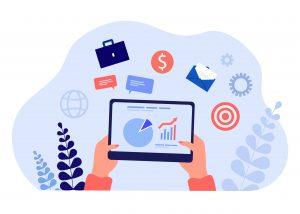For companies managing complex operations, agility is key. Enterprise Resource Planning (ERP) systems are no longer just tools for basic business functions; they are powerful engines for data-driven decision-making across departments. By integrating ERP with other critical business processes, companies can leverage real-time data and insights to inform decision-making. This article explores how ERP drives data-driven insights, the components that support this transformation, and steps for leveraging ERP as a strategic asset.
How ERP Drives Data-Driven Decision Making
ERP systems now offer capabilities beyond managing transactions and workflows. With the integration of advanced analytics and real-time data processing, ERP systems consolidate information across departments, ensuring accuracy and accessibility. This approach aligns with best practices for maximizing ERP productivity, as outlined in our guide on ERP optimization.
Breaking down data silos is a primary benefit, enabling departments to make decisions based on a shared view of operations. This comprehensive data approach supports coordinated, data-driven decision-making across the company.
Real-Time Data Visibility and Responsiveness

Modern ERP systems excel in providing real-time visibility, crucial for industries that need to adapt to fluctuating demand or supply chain challenges. Companies using ERP can monitor KPIs and identify issues before they escalate, reducing the risk of costly delays. For organizations seeking a deeper understanding of ERP’s role in supply chain management, IT-enabled strategies can enhance logistics and responsiveness.
Enhanced Predictive Analytics and Forecasting
ERP systems with predictive analytics capabilities empower companies to forecast trends based on historical and emerging data, aiding in areas like demand planning, scheduling, and financial projections. Predictive insights within ERP support companies in preparing for market fluctuations and adjusting operations proactively.
Data-Driven Cost Management
A significant advantage of ERP systems is their ability to optimize costs through data-driven insights. Cost management modules in ERP systems provide detailed insights into expense areas, such as procurement, labor, and logistics. This transparency allows companies to spot cost-saving opportunities, streamline expenses, and develop more effective budgets.
For instance, an ERP system might reveal that a company is spending excessively on expedited shipping due to inconsistent inventory levels. By analyzing procurement data, the ERP could help adjust ordering schedules, ensuring stock levels are maintained without resorting to costly rush shipments.
Strengthening Compliance and Reducing Risks
Compliance and risk management are often complex, particularly in regulated industries like healthcare and finance. ERP systems simplify compliance by providing audit trails, regulatory reporting, and real-time monitoring of compliance metrics. This comprehensive tracking reduces the risk of non-compliance, which can lead to costly fines or reputational damage. Moreover, ERP’s centralized data storage ensures data accuracy, helping organizations meet strict regulatory standards more easily.
A pharmaceutical company, for example, can use ERP to monitor compliance with Good Manufacturing Practices (GMP) by automatically logging production details, tracking quality checks, and ensuring that documentation meets regulatory requirements. This not only reduces the risk of non-compliance but also improves transparency and trust with regulators and customers.
Empowering Human Resources with Data-Driven Insights
<img decoding="async" data-skip-lazy="data-skip-lazy" src="https://www.litcom.ca/wp-content/uploads/2020/01/4528065-scaled-300x200.jpg" alt="" width="300" height="200" class="alignnone size-medium wp-image-15930" srcset="https://www.litcom.ca/wp-content/uploads/2020/01/4528065-scaled-300x200.jpg 300w, https://www.litcom.ca/wp-content/uploads/2020/01/4528065-scaled-1024x683.jpg 1024w, https://www.litcom.ca/wp-content/uploads/2020/01/4528065-768x512.jpg 768w, https://www.litcom.ca/wp-content/uploads/2020/01/4528065-scaled-1536x1024.jpg 1536w, https://www.litcom.ca/wp-content/uploads/2020/01/4528065-scaled-2048x1366.jpg 2048w, https://www.litcom.ca/wp-content/uploads/2020/01/4528065-scaled-500x333.jpg 500w, https://www.litcom.ca/wp-content/uploads/2020/01/4528065-scaled-800x533.jpg 800w, https://www.litcom.ca/wp-content/uploads/2020/01/4528065-scaled-1280x854.jpg 1280w, https://www.litcom.ca/wp-content/uploads/2020/01/4528065-scaled-1920x1280.jpg 1920w" sizes="(max-width: 300px) 100vw, 300px" />

For example, an organization facing high turnover rates might use ERP data to identify trends in employee exits, enabling them to address potential issues and improve retention strategies. Furthermore, ERP’s talent management tools can help identify top performers, allowing HR teams to focus on employee development and succession planning.
Enhanced Customer Satisfaction through Data-Driven Processes
ERP systems also contribute to customer satisfaction by ensuring that customer-facing teams have accurate, real-time data. By linking customer data across sales, support, and logistics departments, ERP systems improve response times and ensure that customers receive consistent, high-quality service.
Take, for instance, a business-to-business (B2B) company that uses ERP to manage its customer relationships. With insights into customer purchase history, preferences, and support inquiries, the sales team can proactively engage with clients, offering timely solutions or products that meet their needs. This level of personalized service strengthens customer loyalty and boosts satisfaction.
Steps to Start Leveraging ERP for Data-Driven Decisions
- Define Key Metrics and Objectives
Before implementing or optimizing an ERP system, companies should define the metrics they aim to track and the objectives they hope to achieve. By focusing on specific goals—whether it’s improving inventory turnover, reducing operational costs, or increasing customer satisfaction—businesses can tailor the ERP system to meet their unique needs. - Centralize Data and Eliminate Silos
A data-driven approach requires seamless access to information. Ensuring that all relevant data is centralized within the ERP system is essential to avoid silos. This approach facilitates holistic analysis, where departments can make decisions based on a comprehensive understanding of company performance. - Invest in Training and Change Management
Even the most advanced ERP systems are only as effective as the people who use them. Training employees to use the system and understand its data-driven capabilities is critical. By fostering a culture that values data-driven decision-making, companies can maximize the return on their ERP investment. - Continuously Monitor and Adjust
Data needs evolve, and so do ERP capabilities. Regularly monitoring performance and adjusting configurations helps ensure the ERP system remains aligned with business goals and responds effectively to industry changes.
Final Thoughts
Modern ERP systems have transcended their original function as mere operational tools to become strategic assets for data-driven decision-making. By unifying data, enhancing predictive capabilities, and supporting proactive planning, ERP systems empower companies to make informed choices that drive efficiency, optimize costs, and ultimately achieve competitive advantage. For businesses looking to take their operations to the next level, exploring an ERP consultation is a critical step in transforming data into a strategic asset, building resilience, and fostering sustainable growth.
The Litcom Approach: Transforming ERP into a Strategic Asset
At Litcom, we help organizations leverage ERP systems as strategic assets by guiding them through every stage of ERP implementation and optimization. Our Vendor Selection and IT System Implementation services ensure that businesses choose the right ERP solutions tailored to their unique needs and growth objectives.
Our approach includes:
- Vendor Assessment & Selection: We conduct a thorough assessment to help you select an ERP vendor that aligns with your business requirements, scalability needs, and budget.
- Data-Driven Strategy: Litcom works with you to define key performance metrics and goals, enabling your ERP to support data-driven decision-making across departments.
- Centralized Data Integration: We ensure that your ERP consolidates data effectively, breaking down silos and providing a unified, real-time view of your operations.
- Change Management & Training: Our team supports employee training and change management, ensuring that your team understands the ERP’s capabilities and uses it to drive meaningful insights.
- Ongoing Optimization: We provide continuous support to fine-tune ERP configurations and adapt to evolving business needs, helping you get the most from your ERP investment.
With Litcom’s expertise, your ERP system becomes more than just a tool—it’s a foundation for making data-driven decisions, optimizing costs, and positioning your company for long-term success.
The post Leveraging ERP for Data-Driven Decision Making: A Strategic Advantage for Modern Enterprises first appeared on Litcom.
